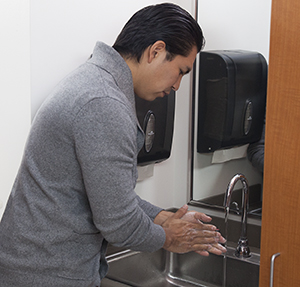Your Baby in the NICU: Understanding Infection
 |
Wash hands often to help prevent infection.
|
All babies are at risk for infection. This is because a baby’s immune system (the body’s defense against disease) needs time to develop. While it’s developing, your baby is more likely to get sick from germs than older children and adults are. A preemie’s immune system is less mature than a term baby’s, which puts preemies at higher risk of developing an infection. Certain health problems also raise your baby’s risk for infection.
Types of infection
Infection occurs when germs enter the body. These are the most common types of infections in a newborn:
- Localized infection (infection of one area of the body)
- Systemic infection or Sepsis (infection that spreads to the organs of the body through the bloodstream)
- Meningitis (infection of the fluid surrounding the brain or spinal cord)
How did my baby get an infection?
There are many ways a newborn could get an infection:
- Before birth, amniotic membranes can rupture (break open). This allows germs to travel up the mother’s vagina and into the uterus, infecting the baby.
- Before birth, germs can pass through the placenta from the mother to the baby.
- During birth, germs may pass from the mother to the baby.
- After birth, germs from the environment can enter the baby’s body. This may be more likely to happen if there’s a break in the baby’s skin, or during a procedure in which a tube or intravenous line (IV) is inserted into the body.
How is infection treated?
To treat infection, a healthcare provider gives an antibiotic medicine through an IV (intravenous line). If your baby doesn’t have an infection but is at increased risk for one, a healthcare provider may give your baby antibiotics as a precaution. The length of time your baby will need medicine varies, depending on the type of infection he or she has. The neonatal intensive care unit (NICU) staff will tell you more about the medicine and any possible side effects. During treatment, the healthcare team will take special precautions to keep germs from spreading to other babies in the NICU.
What are the long-term effects?
How your baby does depends on many factors. These include where the infection is, how bad it is, and what type of germ caused it. Talk to your baby's healthcare provider about how long it will take for your baby to recover and any follow-up that may be needed.
Your role as a parent
Watch your baby for the following signs of infection. If you notice any of these signs, alert your baby's healthcare provider right away.
- Less activity
- Increased breathing problems or apnea (stopping breathing)
- Redness or discharge around the belly button or anywhere else
- The baby feels cold or hot
Help prevent infection with handwashing
Most germs are spread on hands. Handwashing is the best way to prevent germs from spreading. Use the following steps. (Healthcare providers may ask you to follow a different procedure while your baby is in the NICU.)
- Remove any rings, bracelets, or watches you’re wearing. It can be hard to clean under these. (You may want to stop wearing jewelry to the NICU.)
- Use warm water and plenty of soap to work up a good lather.
- Clean your whole hand, under your nails, between your fingers, and up your wrists. Don’t just wipe—rub well.
- Keep washing for at least 10 to15 seconds. You may be surprised how long this takes, so be sure to count.
- Rinse. Let the water run down your fingertips, not up your wrists.
- Limit the number of people who visit your baby
|
Special notes for parents of preemies
If you have a preemie in the NICU, the staff may ask you to follow additional precautions to help keep infection from spreading to your baby. The NICU staff will tell you more.
|
© 2000-2021 The StayWell Company, LLC. All rights reserved. This information is not intended as a substitute for professional medical care. Always follow your healthcare professional's instructions. This information has been modified by your health care provider with permission from the publisher.